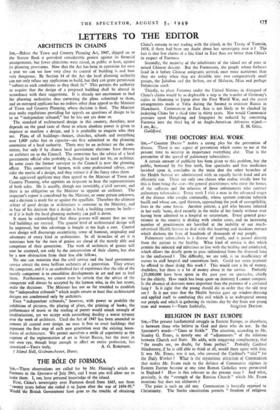THE ROLE OF FORMOSA
Sut,—Three observations are called for by Mr. Fleming's article on Formosa in the Spectator of July 29th, and I trust you will allow me to make them. I, too, have personal knowledge of the island. •
First, China's sovereignty over Formosa dated from 1683, not from " twenty years before she ceded it to Japan after the war of 1894-95." Would the British Government have gone to the trouble of obtaining China's consent to our trading with the island, in the Treaty of Tientsin, 1858, if there had been any doubt about her sovereignty over it ? The fact is that few claims of a like kind in East Asia arc better than China's in respect of Formosa.
Secondly, the majority of the inhabitants of the island are of pure or mixed Chinese descent. But the Formosans, the people whose forbears lived in it before Chinese emigrants arrived, once more numerous than they are today when they are divisible into two comparatively small groups, the Jukuban and the Seiban, are of Malayan, Miao and perhapt Polynesian stock.
Thirdly, to place Formosa under the United Nations in disregard of China's claims would be as deplorable a step as the transfer of Germany's rights in Shantung to Japan after the First World War, and the secret arrangements made at Yalta during the Second to reinstate Russia in Manchuria. Communism in East Asia is not likely to be checked by jockeying China for a thied time in thirty years. Nor would Communist pressure upon Hongkong and Singapore be reduced by converting Formosa into the third leg of an Anglo-American defensive tripod.—


































 Previous page
Previous page